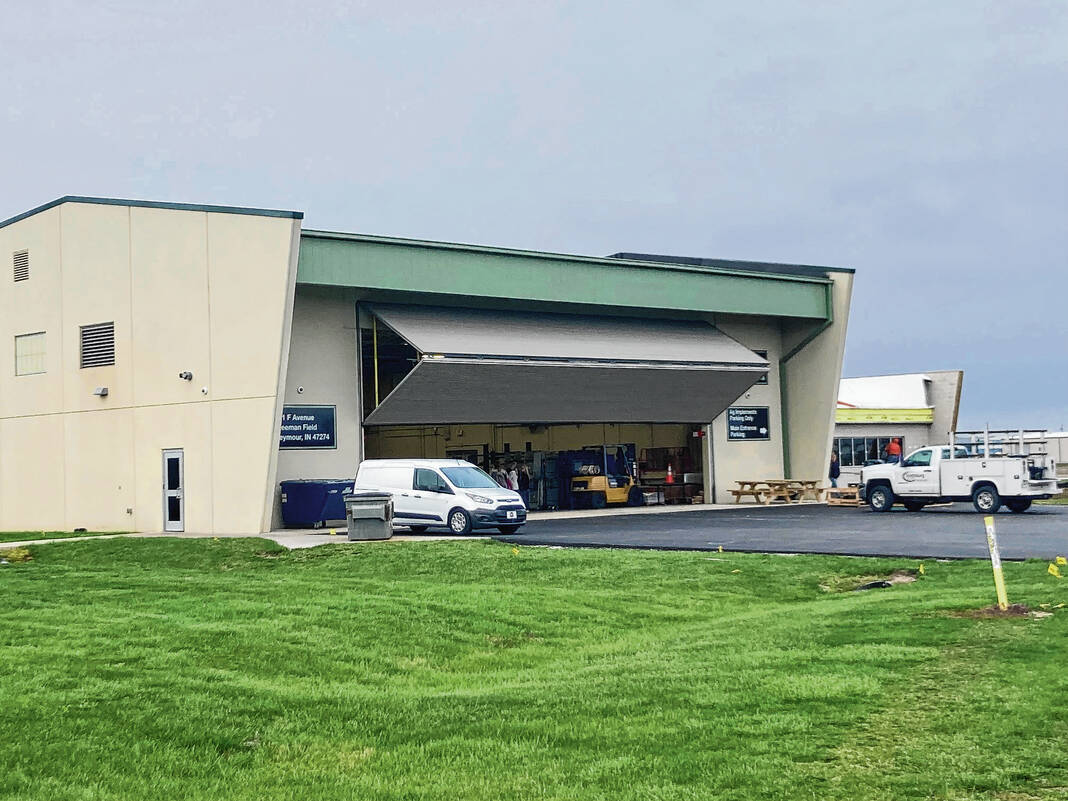The Jackson County Chamber of Commerce invited area farmers, members of county FFA chapters and others in the community to its annual Ag Breakfast.
Those in the attendance Friday morning were treated to breakfast, helped scholarship winners celebrate their success and had the chance to learn more about the county’s agricultural industry from a local farmer.
Two seniors from high schools in the county read their winning essays during the event at the Seymour Ag-Science and Research Farm at Freeman Field. They had written the essays for a competition to receive scholarship money from the Dick Moren Agribusiness Scholarship. Moren is chairman of the chamber’s agribusiness committee.
Trinity Lutheran High School senior Hannah Kerkhof wound up receiving a $1,000 scholarship for her efforts, and Brownstown Central High School senior Eli Wischmeier received a $500 scholarship.
Both said they plan to attend Purdue University in the fall to pursue degrees in the school’s College of Agriculture.
Kerkhof’s essay covered how agriculture is a major contributor to the global economy and its significance for the local economy.
“Food is produced all over the world from different kinds of people, from the forest garden farmer in South America to the rice field worker in Asia and all the way to the corn farmers and hog producers here in Jackson County, Indiana, the place that I’m proud to call home,” she said.
According to Data USA, Kerkhof said agriculture employs 3.24% of people in Jackson County, which is about 1,400 people out of the county’s population of 44,231.
The key to Jackson County’s success, Kerkhof said, is a working relationship between the agriculture industry and other industries, such as manufacturing, service, health care, education and food service.
“This mutualistic relationship and shared respect between industries help our county to continue to grow financially and improve the overall quality of living for everyone who lives here,” she said.
Kerkhof said local companies, such as Rose Acre Farms and Premier Companies, bring money into the county from all over the world, and county residents help support agriculture by buying goods from farmers markets.
“All of these businesses have one thing in common: Without agriculture, they wouldn’t have supplies to make their products or food to keep their workers,” Kerkhof said. “Agriculture has strong roots in Jackson County and has been one of the most important industries here since our founding in 1816.”
Wischmeier opened his essay by saying he has been raised around agriculture his whole life and learned about the agriculture industry and how to farm from his father, James Wischmeier.
He operated a sweet corn business with his brothers and sold more than 4,000 dozens of sweet corn within two months.
“Local residents supported us in our endeavor by also being able to enjoy locally grown sweet corn,” Wischmeier said. “Not only does agriculture help my brothers and I, but we help companies by buying other products, so it all works as a cycle.”
Wischmeier said the future of agriculture is changing tremendously. Premier Companies and Kova Fertilizer Inc., he said, are being careful with the amount of chemicals they are letting farmers use so they don’t run out.
These same companies, Wischmeier said, believe they have enough fertilizer this year.
When local residents buy cars and gas, Wischmeier said they still support companies in the transportation industry that haul crops and provide equipment for farmers.
“Not only will people buy groceries from our local grocery stores or eat at their favorite local restaurants, these same people purchase cars and trucks to transport them to and from work,” he said. “By doing so, this helps support our local car dealerships, tire shops, gas stations and mechanics.”
Seymour farmer Ben Thompson of B&A Thompson Grain Farm participated in a question-and-answer session with Dan Robison, director of the chamber, to give a local perspective on what a career in agriculture is like.
Robison asked how farming contributes to the community as a whole, and Thompson said agriculture provides food through crops, fuel by using corn and soybeans in ethanol, employment through job opportunities and taxes to the county.
For a 1,000-acre piece of farmland in Jackson County, Thompson said it would provide the county somewhere between $15,000 and $20,000 in property taxes.
When asked how he handles the ups and downs of farming, Thompson said farming can have unique issues, and farmers should recognize them and anticipate them.
He said when he was in a senior capstone class at Purdue, every other student in the class was shocked when he told the class his farm would flood due to Jackson County’s floodplains. Thompson said he combated the flooding to replant. He encouraged building toward financial stability for a safety net when disaster strikes.
To take his mind off of the business of farming, Thompson said he takes vacations, goes to restaurants and goes out of the county to relax.
Regarding how inflation affects farmers, Thompson said input costs are all increasing for farmers, but the good news is commodity prices are, as well.
“Inflation is hitting us as hard as everybody else, but we have to manage that to make sure that we have the inputs that we need to do our job, and the market will hopefully take advantage of good commodity prices, as well,” he said.
Looking into the future of agriculture in the United States, Thompson said technology is allowing for consistently more products produced with less acres.
He said when he drives up Interstate 65 to Indianapolis, he notices many warehouses that are bigger than his grain fields covering good farmland, which he views as a natural resource like oil or trees.
“That farmland will never be the same,” Thompson said. “I think that it will come more to the forefront that agriculture is important. We need to make sure that we’re respecting that soil.”




